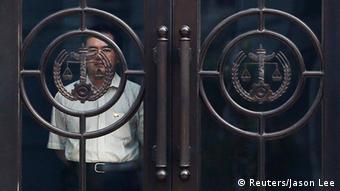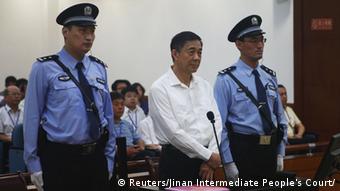作为被告,薄熙来在庭审首日几乎驳回对自己的所有指控,让不少人大跌眼镜。德语媒体指出,庭审首日的情况虽出人意外,但它只是显示出,中国还远谈不上法治。
(德国之声中文网)薄熙来周四在他的“受贿、贪污和滥用职权”案庭审首日的表现及法院的表现成为周五德语媒体有关中国报道和评论的一大焦点。各媒体所论侧
重点虽不尽相同,但有一点看法一致,即:庭审首日的情况再度显示,中国依然是以党代法,党比法大,因此,在试图采取较为开放和透明的手段显示法治进步时,
不免跌入尴尬境地,由此而言,薄熙来的“不听话”,可算是给了党一次教训。《法兰克福汇报》有如下评论:
“以中国国情衡量,公众在薄熙来案庭审中看到的那一幕,着实可圈可点。在类似的威权国家的类似审判进程可以完全是另一个样子。薄案也明 显不同于对其妻的审判案。她曾老实服罪,并称法庭工作尽责。薄熙来在庭上的表现让人明白了,此人为什么会被党的其他领导人认定对其各自的地位构成威胁。薄 首先就是因此而被送上法庭的。若真的只是因为腐败和滥用职权,而且对每一个类似案件都同样强硬制裁,剩下的领导干部便不多了。很难想象,薄在法庭上的好斗 姿态是党的领导层所批准的审判案导演脚本中规定好的。人们得到的印象倒是,这个人虽然倒台了,但仍以为自己还掌握着某些权力。”
与伸张正义无关
《南德意志报》把薄案同30年前的“四人帮”作比较,这样评论道:
“不久前,薄熙来还是重庆的党委书记,尚被许多人看成是中国的希望所在。人们可以把他的垮台视为表现权力、野心、野蛮、阴谋的寓言。人们也可以从他的事例 中读出关于中国现状的一些精要。它的审判案是30多年前那场审判案以来的最大一场‘秀案’。当年的那场审判案试图把文革的罪责完全归于以毛的遗孀江青为首 的四人帮身上。与薄一样,被告江青也没想过要对法庭俯首称臣。……然而,对她的判决在开庭前便已作出,正如薄从前的对手们—现在在北京的领导人—一样,早 已确定了他的命运。
“此案并非为了伸张正义。它只有一个目的,那就是,尽量减小对党的损害。领导层有三大目标,其一,尽快结束这一丑闻,—今秋要讨论经济 和金融领域的新改革;其二,避免党内出现分裂,—薄熙来仍有众多同情者,所以,判决不能过于严厉:不能是死刑,也不能是无期徒刑,决不能制造出一个殉道者 来;其三,将党在人民中的形象损害减少到最低限度。因此,便来一个大胆的尝试,把这次公关上的灾难解释成是政治进步的一个象征。……
“统治中国的不是法律;在中国,是利用法律进行统治。今天的情况与30年前并无二致。(知名律师)张思之便指出,自四人帮审判案以来,中国的司法是‘原地踏步’。
“薄熙来审判案据称也是为了迟迟未能实现的希望,根据这样的希望,公正将在反腐斗争中导致法治。而公正恰是许多人在这个新中国里苦苦寻求而不得的东西。这 些人在薄熙来事件中看到了政治改革的机会。然而,以总书记习近平为首的新领导层早已表明,它对独立司法这样的观念持何种看法:嗤之以鼻。原因就在于,对那 一小部分分享权力和利益的少数精英而言,独立司法十分危险。”
摘编:凝炼
责编:石涛
[摘编自其它媒体,不代表德国之声观点]
“以中国国情衡量,公众在薄熙来案庭审中看到的那一幕,着实可圈可点。在类似的威权国家的类似审判进程可以完全是另一个样子。薄案也明 显不同于对其妻的审判案。她曾老实服罪,并称法庭工作尽责。薄熙来在庭上的表现让人明白了,此人为什么会被党的其他领导人认定对其各自的地位构成威胁。薄 首先就是因此而被送上法庭的。若真的只是因为腐败和滥用职权,而且对每一个类似案件都同样强硬制裁,剩下的领导干部便不多了。很难想象,薄在法庭上的好斗 姿态是党的领导层所批准的审判案导演脚本中规定好的。人们得到的印象倒是,这个人虽然倒台了,但仍以为自己还掌握着某些权力。”
与伸张正义无关
《南德意志报》把薄案同30年前的“四人帮”作比较,这样评论道:
“不久前,薄熙来还是重庆的党委书记,尚被许多人看成是中国的希望所在。人们可以把他的垮台视为表现权力、野心、野蛮、阴谋的寓言。人们也可以从他的事例 中读出关于中国现状的一些精要。它的审判案是30多年前那场审判案以来的最大一场‘秀案’。当年的那场审判案试图把文革的罪责完全归于以毛的遗孀江青为首 的四人帮身上。与薄一样,被告江青也没想过要对法庭俯首称臣。……然而,对她的判决在开庭前便已作出,正如薄从前的对手们—现在在北京的领导人—一样,早 已确定了他的命运。
“此案并非为了伸张正义。它只有一个目的,那就是,尽量减小对党的损害。领导层有三大目标,其一,尽快结束这一丑闻,—今秋要讨论经济 和金融领域的新改革;其二,避免党内出现分裂,—薄熙来仍有众多同情者,所以,判决不能过于严厉:不能是死刑,也不能是无期徒刑,决不能制造出一个殉道者 来;其三,将党在人民中的形象损害减少到最低限度。因此,便来一个大胆的尝试,把这次公关上的灾难解释成是政治进步的一个象征。……
“统治中国的不是法律;在中国,是利用法律进行统治。今天的情况与30年前并无二致。(知名律师)张思之便指出,自四人帮审判案以来,中国的司法是‘原地踏步’。
“薄熙来审判案据称也是为了迟迟未能实现的希望,根据这样的希望,公正将在反腐斗争中导致法治。而公正恰是许多人在这个新中国里苦苦寻求而不得的东西。这 些人在薄熙来事件中看到了政治改革的机会。然而,以总书记习近平为首的新领导层早已表明,它对独立司法这样的观念持何种看法:嗤之以鼻。原因就在于,对那 一小部分分享权力和利益的少数精英而言,独立司法十分危险。”
摘编:凝炼
责编:石涛
[摘编自其它媒体,不代表德国之声观点]
薄不屑 蹺二郎腿受審
爆料驚全場:谷開來是死刑犯 吸毒的
 蹺腿專注
蹺腿專注
薄熙來准許坐著應訊,但他不時蹺著二郎腿(箭頭處),一臉不屑。翻攝網路
【大
陸中心╱綜合報導】中共重慶市前市委書記薄熙來被控受賄、貪污、濫用職權案,昨在山東濟南開庭。已一年半未露面的薄熙來顯得消瘦憔悴、兩鬢花白,已無昔日
霸氣,法官准許他坐著應訊。他聆訊時,表情專注但不時蹺著二郎腿,一臉不屑。薄妻谷開來昨未現身,但在書面證詞稱丈夫在住處保險箱放了大筆金錢,供兒子薄
瓜瓜在英國上學,薄則爆「谷開來是吸毒的」,說法不可信。
今
年六十四歲的薄熙來,父親是中共元老薄一波,與妻子谷開來育有一子薄瓜瓜,歷任遼寧省大連市市長、重慶市市委書記,曾被視為躋身中共第五代領導班子的熱門
人選。去年二月,薄的心腹、重慶市公安局長王立軍擅闖美國駐成都領事館,揭發薄熙來夫婦不法情事。薄去年三月十四日出席政協與人大兩會閉幕式後,十五日即
被解除重慶市委書記職務,從此沒再露面。
 載著薄熙來的車隊昨抵達山東濟南法院,準備開庭。美聯社
載著薄熙來的車隊昨抵達山東濟南法院,準備開庭。美聯社認罪是「違心承認」
這場世紀審判昨上午八時三十分在山東省濟南市中級人民法院開庭,法院如臨大敵,清晨六時就派出上百公安和武警把守,薄的五名家屬、媒體與民眾共一百一十人獲准旁聽。
薄熙來著白襯衫、深色西褲現身,沒戴手銬。法院先審理受賄罪,檢方指出,二○○○年至二○一二年期間,薄熙來單獨或透過谷開來、薄瓜瓜,收受大連 國際發展公司總經理唐肖林、大連實德集團董事長徐明給的財物,共約二千一百七十九萬人民幣(約一點零六億元台幣)。其中唐肖林三次行賄共約五百四十二萬台 幣,徐明約一點零一億台幣。
薄辯駁:「唐肖林說給我三次送錢的事情是不存在的。我曾在中央紀律檢查委員會對我審查期間,違心的承認過這個事情。當時我完全不知道這些事情的細 節,腦中一片空白。」他還怒斥唐肖林像「瘋狗一樣亂咬」,「剛才看到唐肖林的錄像(證詞錄影),我真是看到一個人出賣靈魂的人的醜態。」薄還指控中紀委調 查時對他有「不正當的壓力」。
薄熙來著白襯衫、深色西褲現身,沒戴手銬。法院先審理受賄罪,檢方指出,二○○○年至二○一二年期間,薄熙來單獨或透過谷開來、薄瓜瓜,收受大連 國際發展公司總經理唐肖林、大連實德集團董事長徐明給的財物,共約二千一百七十九萬人民幣(約一點零六億元台幣)。其中唐肖林三次行賄共約五百四十二萬台 幣,徐明約一點零一億台幣。
薄辯駁:「唐肖林說給我三次送錢的事情是不存在的。我曾在中央紀律檢查委員會對我審查期間,違心的承認過這個事情。當時我完全不知道這些事情的細 節,腦中一片空白。」他還怒斥唐肖林像「瘋狗一樣亂咬」,「剛才看到唐肖林的錄像(證詞錄影),我真是看到一個人出賣靈魂的人的醜態。」薄還指控中紀委調 查時對他有「不正當的壓力」。
妻指賄款供子求學
薄熙來再次露面,不少網民不約而同地以「老了」、「整個人洩了氣了」形容。
外 界最好奇薄妻谷開來的證詞,但她昨未現身,而是提供兩份書面證詞。谷指出,薄在大連、遼寧、北京與重慶任職期間,住處都放了一個共同保險箱,裡面放了大筆 現金,她從保險箱拿過三次錢,供薄瓜瓜在英國求學用,其中在遼寧拿了約一百五十萬元台幣,在北京時拿了一筆數萬人民幣,及約兩百四十萬元台幣。
外 界最好奇薄妻谷開來的證詞,但她昨未現身,而是提供兩份書面證詞。谷指出,薄在大連、遼寧、北京與重慶任職期間,住處都放了一個共同保險箱,裡面放了大筆 現金,她從保險箱拿過三次錢,供薄瓜瓜在英國求學用,其中在遼寧拿了約一百五十萬元台幣,在北京時拿了一筆數萬人民幣,及約兩百四十萬元台幣。
指妻證詞滑稽可笑
薄說,他對妻子的說法感到「非常滑稽、非常可笑」,「谷開來就在我們七十一號房(北京住處)另一個巨大的保險櫃裡放著很多錢,大大高於這八萬美元和五萬美元。」薄的辯護律師更稱谷有精神障礙,證詞不可信,還透露谷的錢比薄還多。
香港《蘋果日報》獲悉,薄熙來為了反駁妻子谷開來的證詞,頻頻大爆料。他說:「谷開來是個死刑犯,她為了立功,什麼供都做得出。」「你們檢方應該都查清楚了,谷開來是吸毒的!」令旁聽者一陣譁然。
薄 的金主徐明是昨唯一出席的證人,他與薄當庭對質。兩人言詞交鋒,火藥味十足,薄熙來不斷質疑徐是否與他有過私下交易,徐十分窘迫,幾乎全部回答「沒有」。 消息人士透露,旁聽的薄家親屬對薄的庭上表現也感到意外,直言「很刺激」。徐明指出,他除了拿錢給谷開來買別墅,連薄瓜瓜與朋友去非洲旅行、信用卡帳單, 都由他埋單。薄稱他只知徐明與薄瓜瓜「關係不錯」,但徐是妻子的朋友,「我沒有在意過徐明。我和他沒有共同語言。」
香港《蘋果日報》獲悉,薄熙來為了反駁妻子谷開來的證詞,頻頻大爆料。他說:「谷開來是個死刑犯,她為了立功,什麼供都做得出。」「你們檢方應該都查清楚了,谷開來是吸毒的!」令旁聽者一陣譁然。
薄 的金主徐明是昨唯一出席的證人,他與薄當庭對質。兩人言詞交鋒,火藥味十足,薄熙來不斷質疑徐是否與他有過私下交易,徐十分窘迫,幾乎全部回答「沒有」。 消息人士透露,旁聽的薄家親屬對薄的庭上表現也感到意外,直言「很刺激」。徐明指出,他除了拿錢給谷開來買別墅,連薄瓜瓜與朋友去非洲旅行、信用卡帳單, 都由他埋單。薄稱他只知徐明與薄瓜瓜「關係不錯」,但徐是妻子的朋友,「我沒有在意過徐明。我和他沒有共同語言。」
「當局始料未及」
昨庭訊傍晚六時半結束,今早八時半將繼續審理貪污罪、濫用職權罪。北京法律學者金曉鵬表示,薄當庭翻供讓當局始料未及。中國政治評論家高瑜認為,鐵道部前部長劉志軍貪約三點一億元台幣,不過判死緩,薄的刑期會在十五年到無期徒刑間。
薄熙來出庭 重要辯詞
●翻供
唐肖林說給我3次送錢的事情是不存在的。我曾在中紀委對我審查期間違心承認過這個事情。當時我完全不知道這些事情的細節,腦中一片空白。
●罵妻
谷開來是個死刑犯,她為了立功,什麼供都做得出。你們檢方應該都查清楚了,谷開來是吸毒的!
資料來源:濟南中院微博
唐肖林說給我3次送錢的事情是不存在的。我曾在中紀委對我審查期間違心承認過這個事情。當時我完全不知道這些事情的細節,腦中一片空白。
●罵妻
谷開來是個死刑犯,她為了立功,什麼供都做得出。你們檢方應該都查清楚了,谷開來是吸毒的!
資料來源:濟南中院微博

薄熙來64歲
●籍貫:山西省定襄縣
●家庭:父為中共元老薄一波,與妻谷開來育有一子薄瓜瓜,與前妻李丹宇育有一子李望知(從母姓)
●學歷:北京大學歷史系、中國社科院研究生院碩士
●經歷:遼寧省大連市市長、遼寧省省長、商務部部長、重慶市市委書記,第16屆中共中央委員、第17屆中共中央政治局委員
●家庭:父為中共元老薄一波,與妻谷開來育有一子薄瓜瓜,與前妻李丹宇育有一子李望知(從母姓)
●學歷:北京大學歷史系、中國社科院研究生院碩士
●經歷:遼寧省大連市市長、遼寧省省長、商務部部長、重慶市市委書記,第16屆中共中央委員、第17屆中共中央政治局委員

薄案大事記
2012/02/06
重慶公安局長王立軍闖入成都美國領事館,揭薄夫婦不法情事
2012/03/15
中共免去薄重慶市委書記職務
2012/09/20
谷開來涉嫌毒殺英商海伍德被判處故意殺人罪,判死刑、緩期2年執行
2012/09/28
薄遭開除黨籍及公職並法辦,被控涉違反黨紀、濫權、與多名女性發生或保持不正當性關係等7問題。坊間盛傳薄至少和大連美女主播張偉杰在內的上百女人有染
2013/08/08
《華爾街日報》揭露薄家在法國坎城的別墅,海伍德、央視前美女主持人姜豐都曾是管理人
2013/08/22
薄熙來在濟南受審
資料來源:《蘋果》資料室
重慶公安局長王立軍闖入成都美國領事館,揭薄夫婦不法情事
2012/03/15
中共免去薄重慶市委書記職務
2012/09/20
谷開來涉嫌毒殺英商海伍德被判處故意殺人罪,判死刑、緩期2年執行
2012/09/28
薄遭開除黨籍及公職並法辦,被控涉違反黨紀、濫權、與多名女性發生或保持不正當性關係等7問題。坊間盛傳薄至少和大連美女主播張偉杰在內的上百女人有染
2013/08/08
《華爾街日報》揭露薄家在法國坎城的別墅,海伍德、央視前美女主持人姜豐都曾是管理人
2013/08/22
薄熙來在濟南受審
資料來源:《蘋果》資料室
外媒看薄案
●英國《每日電訊報》:外界預期這是場按劇本走的審判,但這名64歲的前政治局委員卻在庭上態度傲慢。
●日本《讀賣新聞》:中國破例以微博轉播實況,習近平正嚴打黨內腐敗,這審判就是以此為訴求。
●美國有線電視新聞網(CNN):中國沒給薄熙來的「世紀審判」保留一點餘地。
專家看薄案
●張執中(開南大學公共事務管理學系副教授):習近平若要立威會重判薄,但顧及其背後的太子黨、軍系與左派支持者,薄應不會被判最重刑
●董立文(中央警察大學公共安全系副教授):薄不肯俯首認罪展現其賭徒性格
●張思之(江青當年的辯護律師):薄案審訊比起江青案絕對是大倒退,官方微博不回答提問,法院仍完全控制所有po文,稱不上直播,也不透明
中國網友看薄案
●繆斯娃娃201:今天這個案子上演了夫妻互咬、朋友出賣的狗血劇情
●錯覺了:兩公婆互相掐起來了,非常滑稽非常可笑!
●單身窮鬼看世界:這個(貪污受賄)資料若是真,和薄熙來的位子相比,真是清官一個!
資料來源:綜合外電、新浪微博
●英國《每日電訊報》:外界預期這是場按劇本走的審判,但這名64歲的前政治局委員卻在庭上態度傲慢。
●日本《讀賣新聞》:中國破例以微博轉播實況,習近平正嚴打黨內腐敗,這審判就是以此為訴求。
●美國有線電視新聞網(CNN):中國沒給薄熙來的「世紀審判」保留一點餘地。
專家看薄案
●張執中(開南大學公共事務管理學系副教授):習近平若要立威會重判薄,但顧及其背後的太子黨、軍系與左派支持者,薄應不會被判最重刑
●董立文(中央警察大學公共安全系副教授):薄不肯俯首認罪展現其賭徒性格
●張思之(江青當年的辯護律師):薄案審訊比起江青案絕對是大倒退,官方微博不回答提問,法院仍完全控制所有po文,稱不上直播,也不透明
中國網友看薄案
●繆斯娃娃201:今天這個案子上演了夫妻互咬、朋友出賣的狗血劇情
●錯覺了:兩公婆互相掐起來了,非常滑稽非常可笑!
●單身窮鬼看世界:這個(貪污受賄)資料若是真,和薄熙來的位子相比,真是清官一個!
資料來源:綜合外電、新浪微博

【庭邊花絮】
雙塔壓陣 警號竟一樣
薄熙來昨出庭時,法院派
出兩名高大魁梧的法警站在他兩旁,兩人比身高約186公分的薄熙來高半個頭,近200公分,一般揣測派出「雙塔」是要壓薄的氣勢。眼尖網友還發現,「雙
塔」胸前警徽號碼竟一模一樣,都是「372078」,有網友懷疑他們並非法警,只是臨時請來的演員。

左手比3「最多3年」
濟南中院公布薄聽審照片,被網友轉發逾6萬次。薄的左手比出「3」的手勢,在微博引發熱議。網友貼出不少聯想,包括「最多等3年,我會再回來」、「只要不談『小三』,我就配合」、「今晚三更起義」。

爬牆脫褲 搶鏡頭申訴
薄案昨開庭但是閉門審訊,庭外的場子也頗為熱鬧。有上訪(申訴)者站到圍牆上,當眾把褲子脫掉,露出四角褲,成功吸引媒體鏡頭。也有大批「薄粉」聚集在法院外聲援,高舉毛澤東圖像,引起警方高度緊張。At Bo Xilai Trial, a Goal To Blast Acts, Not Ideas
and August 21, 2013

ChinaFotoPress, via Getty Images
A choir singing in Binzhou, China, in 2011 for the Communist Party’s 90th anniversary.
BEIJING — The paraphernalia
of the global left litters the bookstore called Utopia on the sixth
floor of an office tower here: tomes titled “Mao Zedong’s Road to
Success” and “The Marxian Legacy,” and canvas satchels with Che
Guevara’s visage.
But the store’s most
important product, a Web site that gives voice to the Chinese left, is
missing. “It’s still shut down,” said a woman working at the store.
Chinese officials forced the site to close in April 2012 because of its
fervent backing of Bo Xilai, the former Communist official who invoked Maoist talk to rally popular support during his four-year governance of Chongqing in southwest China. A new site set up by the store is used mainly to sell books and publish nonpolemical commentaries.
With Mr. Bo set to go on
trial on Thursday on charges of corruption, taking bribes and abusing
power, China’s leaders are engaged in a delicate balancing act. On the
one hand, they aim to parade Mr. Bo as a criminal and silence his most
vocal supporters. On the other, they want to avoid tarring the leftist
policies he championed or alienating important revolutionary families.
The tension lays bare the
continuing need to preserve the vaunted place of the party’s original
ideology in China’s political life, nearly 35 years after the party
turned from Maoism to economic reform and opening. As Mr. Bo showed, the
ideology remains the most fundamental wellspring that Chinese
politicians can tap for popular support and legitimacy. Some political
analysts say China’s leader, Xi Jinping, is taking a page from the Bo
playbook when he stresses the importance of learning from Mao and Marx and pushes an old-school “mass line” rectification campaign among party officials.
Those analysts, and leftist allies of Mr. Bo, point out that the charges against him deal mainly with financial transgressions earlier in his career
— bribetaking and corruption or embezzlement — rather than anything
substantially related to the controversial policies he championed during
his governance of Chongqing. There, from 2008 to his dismissal in March
2012, when a murder scandal
involving his wife and a dead British businessman emerged, he pushed
policies in the name of socialist revival. They ranged from building
low-cost housing to promoting mass Communist “red song” sing-alongs to
battling corruption in a “strike black” campaign that liberals
criticized for its human rights abuses.
“People believed in Bo
Xilai because he held up the banner of Mao Zedong,” said Yang Fan, a
professor at the China University of Political Science and Law, and a
founder of the Utopia Web site. “If you don’t use the banner of Mao,
you’re nobody. Who would believe in you?”
“Even more than Bo Xilai,” Mr. Yang added, Mr. Xi “uses a lot of Mao’s words.”
Yet as the trial approaches, the party is intensifying its clampdown on Mr. Bo’s leftist supporters. Some have been detained,
others ordered to avoid making public comments. In late June, a former
college teacher, Wang Zheng, who had gone to Chongqing to help local Bo
supporters find exculpatory evidence, was forced to fly back to Beijing,
where she was detained in the suburbs, according to a first-person
account posted online.
Fears of Bo-inspired
dissent are not unfounded. Ardent leftists have insisted that the
prosecution of Mr. Bo is rooted in personal vendettas. The “Red
Hometown” Web site signified the party’s announcement of his trial date
on Sunday with a headline beginning, “Tragedy!” Leftist commentators
have continued to depict the case as a plot. Last year, leftists
circulated an extraordinary petition online calling for the impeachment
of Wen Jiabao, a political enemy of Mr. Bo who was then the prime
minister; it got more than 1,600 signatures.
Recently, a group of Maoists revived the campaign, and a version of the updated petition supposedly had 3,000 signatures.
China’s far left is small,
but is a vocal part of the political agitation allowed under party
controls. For the party, loyalists who embrace Marx and Mao as patron
saints are useful watchdogs to be unleashed against liberal voices.
But as the party pursued
policies that created huge gaps in wealth and a vastly moneyed elite,
many leftists found in Mr. Bo — with his expensive suits, foreign
business friends and a son educated at elite schools in Britain and the
United States — an unlikely beacon. The son of one of the revered “Eight
Immortals” who helped lead the party in the Mao and Deng Xiaoping eras,
he pursued a place on the elite Politburo Standing Committee by turning
Chongqing into a showcase for policies aimed at securing both market
prosperity and socialist equality.
Many on China’s far left
embraced him as a potential ally; he in turn burnished his new image by
luring leftist journalists, writers and intellectuals to his fief to
extol the “Chongqing model” and sing red with him. (They ignored that
staunch defenders of the capitalist way were also among the pilgrims — Henry Kissinger gave a speech in praise of Mr. Bo at one gala.)
“Bo Xilai’s Chongqing model
showed that the current system can be used to restore relations between
the party and the people,” said Zhang Hongliang, a teacher in Beijing
who is an intellectual leader of the hard-line left. “The people in
Chongqing used to say, ‘The Communist Party has come back.’ ”
Mr. Zhang said that after
Mr. Bo’s fall, some leftists turned against the party leadership. “In
particular, many people who originally supported Xi Jinping began to
complain about him,” he said.
“Because of the Bo Xilai
incident, the whole left wing is a mess,” he added, referring to “a
massive split” between those condemning the party and others who, like
himself, still sought to influence it from within.
One of those who hardened
against party leaders is Han Deqiang, another founder of Utopia and an
associate professor at the Beijing University of Aeronautics and
Astronautics.
“This is an unjust case with charges trumped up out of nothing or exaggerated accusations grafted on from elsewhere,” he said.
Like others, he said he had
noticed Mr. Xi and fellow party leaders donning Mr. Bo’s neo-Maoist
mantle after taking power in November. “China is walking on the path of
Bo Xilai without Bo Xilai himself,” Mr. Han said. “What it proclaims in
public banners is still the same as what Bo Xilai did in Chongqing. But
the problem is, a Bo Xilai road without Bo Xilai lacks substance. It’s
flimsy and fake.”
This week, Mr. Xi gave a
speech in which he stressed the continued importance of Marxism. But he
also appeared to try to reinforce conformity.
“It’s up to propaganda and
ideological work to consolidate the guiding status of Marxism in the
ideological sphere,” Mr. Xi told a conference of propaganda officials in
Beijing, the Xinhua news agency reported Tuesday. “We must uphold,
consolidate and strengthen mainstream thinking and opinion.”
Li Weidong, a political
analyst and magazine editor, noted that the party leadership would have a
hard time convincing leftist critics like Mr. Han that the trial was
anything other than the climax of a political struggle. “They need Bo to
directly admit guilt and apologize in his own voice on television,” Mr.
Li said. “Otherwise, it’s even easier for the left to say it’s all just
a fraud.”
Edward
Wong reported from Beijing, and Chris Buckley from Hong Kong. Jonathan
Ansfield contributed reporting from Beijing, and Patrick Zuo contributed
research from Beijing.



沒有留言:
張貼留言